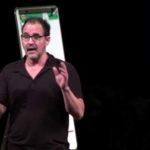We run our website the way we wished the whole internet worked: we provide high quality original content with no ads. We are funded solely by your direct support. Please consider supporting this project.
The Good Samaritan, Non-Violence & Eternal Life
An expert in the law asked Jesus what he had to do “to inherit eternal life” (See the story in Luke 10:25 and following). Jesus asked him what he thought the law said about this issue. The man responded, “’Love the Lord your God with all your heart and with all your soul and with all your strength and with all your mind’ and, ‘Love you neighbor as yourself.’” Jesus stated his agreement with the man’s answer and assured him that if he did this he would inherit eternal life.
But the man wasn’t through. “Who is my neighbor?” he asked. While the command to love one’s neighbor was universally excepted by Jews since it came straight out of the Old Testament (Leviticus 19:18), there was a good bit of controversy over who exactly qualifies as a “neighbor.” Maybe only fellow Jews should be considered neighbors. Maybe only fellow Jews who lived in close proximity to us should be considered neighbors. Maybe only faithful Jews deserve to be regarded as neighbors. Yet, some wondered, perhaps Gentiles who converted to do Judaism should also be considered neighbors. Or, maybe the category of “neighbor” extended to Gentiles who were kind to Jews, even though they didn’t convert to Judaism. Or, in contrast to all of this, were all people to be considered “neighbors”?
Jesus responded by telling the familiar story of “the Good Samaritan.”
In asking, “Who is my neighbor?” the expert was hoping to excuse himself from the duty of loving certain individuals and groups. But the story Jesus told didn’t answer this question. Rather, Jesus transformed the question, “Who is my neighbor?” into the question, “What does it look like for you to be a neighbor?” And the answer was that being a neighbor looks like the Samaritan, showing mercy to a perfect stranger and sacrificing his own resources to do it.
And then, to add insult to injury, Jesus ended the encounter by telling the man, “Go and do likewise.” Go and emulate the Samaritan, whom you formerly despised.
While the theoretical question about who is our neighbor allows us to justify not loving certain people, the personal question about how we are to be a neighbor does not. We address the theoretical, abstract question with our intellect, which is why we can debate endlessly and never get around to actually obeying it. But we can answer the personal, concrete question only with a decision of will, and there’s no way to escape it.
In light of the personal question Jesus raises, the theoretical, abstract question the religious expert raised is exposed for being what it is: namely, an attempt to hide from the personal question. When we debate who our neighbor is, we avoid having to actually engage in the sacrificial activity of being a neighbor. We continue to love only those we think deserve our love, and continue hating those we think deserve to be hated. And we feel justified in our selection.
Jesus brilliantly pulls the rug out from under this self-justifying reasoning as he forces us to ask ourselves: Will I be a neighbor to whomever I happen to come upon?
Finally, we should recall that this whole episode began with the question: “What must I do to inherit eternal life?” This has been the question on the table all along. And now we have Jesus’ answer.
To inherit eternal life, Jesus is saying, we don’t have to answer an assortment of theoretical questions about who is and is not our neighbor. To inherit eternal life, we must simply commit to being one. This isn’t to suggest we earn eternal life by being a neighbor, but it does suggest that our willingness to love and serve like the Samaritan reflects the kind of heart that inherits eternal life.
To manifest eternal life, as it’s depicted in this profound story, we must purge ourselves of the self-justifying reasoning that characterized the expert of the law. We must collapse all our self-serving judgments about who deserves our love and who doesn’t. We must be willing to love like God loves, as indiscriminately as the sun shines and the rain falls. In the kingdom, we don’t get to choose whom we love and don’t love. We don’t get to decide who’s a neighbor and who’s an enemy.
As MennoNerds, we all have found certain distinctives of Anabaptism to be central in our expression of faith. This article is part of a MennoNerds Synchro-Blog in the month of May on Anabaptism.
To find all the other articles in the Mennonerds on Anabaptism synchro blog click here.
Category: General
Tags: Judgment, Love, Mennonerds, Non-Violence, Violence
Related Reading

Did the Crucifixion Allow God to Atone for His OWN Sins? (podcast)
Greg considers God’s nature and if he could sin. Dan confesses an old gambling habit. Episode 477 http://traffic.libsyn.com/askgregboyd/Episode_0477.mp3

The Gift of Smallness
ram reddy via Compfight Jonathan Martin wrote this piece entitled Feeling at home in my smallness a couple of weeks ago. If you’ve been feeling like the weight of the world is on your shoulders and it’s up to you to do something amazing or if you’ve been taking yourself a little too seriously, you…

The Extremity of God’s Love
In response to questions he has received about whether Jesus was actually separated from the Father on the cross, Greg fleshes out his perspective on this. The love that unites the Trinity is the very same love that resulted in the separation of the Father from the Son. This separation actually expresses the great love…

Depression and Willpower
In Greg’s book Escaping the Matrix, he and his co-author discuss the topic of depression. Having experienced first hand the effects of depression, we, the editors at ReKnew, recognize that this short post cannot address the complex realities associated with it. There are no easy answers. However, we wanted to offer this short excerpt in…

How God Changes the World
God’s hopes for us began before the creation of the world. And what God intended from the beginning gives us insight into how God works to bring about what he intends. In the first chapter of Ephesians, Paul teaches that God “chose us in [Christ] before the creation of the world to be holy and…

Black Lives Matter, the Police, and Spiritual Warfare
Christ calls us to stand for a different kind of kingdom and this requires that we think in different ways about the violence that is gripping our country. In this short clip from Greg’s sermon this last weekend, we are introduced to a different way. Listen and hear the challenge to understand the deeper reality…

